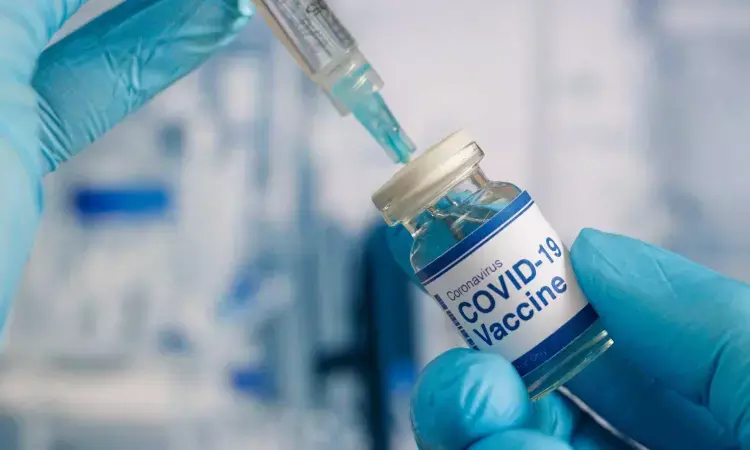- Home
- Medical news & Guidelines
- Anesthesiology
- Cardiology and CTVS
- Critical Care
- Dentistry
- Dermatology
- Diabetes and Endocrinology
- ENT
- Gastroenterology
- Medicine
- Nephrology
- Neurology
- Obstretics-Gynaecology
- Oncology
- Ophthalmology
- Orthopaedics
- Pediatrics-Neonatology
- Psychiatry
- Pulmonology
- Radiology
- Surgery
- Urology
- Laboratory Medicine
- Diet
- Nursing
- Paramedical
- Physiotherapy
- Health news
- Fact Check
- Bone Health Fact Check
- Brain Health Fact Check
- Cancer Related Fact Check
- Child Care Fact Check
- Dental and oral health fact check
- Diabetes and metabolic health fact check
- Diet and Nutrition Fact Check
- Eye and ENT Care Fact Check
- Fitness fact check
- Gut health fact check
- Heart health fact check
- Kidney health fact check
- Medical education fact check
- Men's health fact check
- Respiratory fact check
- Skin and hair care fact check
- Vaccine and Immunization fact check
- Women's health fact check
- AYUSH
- State News
- Andaman and Nicobar Islands
- Andhra Pradesh
- Arunachal Pradesh
- Assam
- Bihar
- Chandigarh
- Chattisgarh
- Dadra and Nagar Haveli
- Daman and Diu
- Delhi
- Goa
- Gujarat
- Haryana
- Himachal Pradesh
- Jammu & Kashmir
- Jharkhand
- Karnataka
- Kerala
- Ladakh
- Lakshadweep
- Madhya Pradesh
- Maharashtra
- Manipur
- Meghalaya
- Mizoram
- Nagaland
- Odisha
- Puducherry
- Punjab
- Rajasthan
- Sikkim
- Tamil Nadu
- Telangana
- Tripura
- Uttar Pradesh
- Uttrakhand
- West Bengal
- Medical Education
- Industry
Novel PET radiotracer associated with superior tumor localization after COVID-19 vaccination

Researchers have developed a novel PET radiotracer that reduces number of false-positive cancer findings after COVID-19 vaccination. Among cancer patients recently vaccinated for COVID-19, 68Ga-FAPI imaging offers superior lesion detection without vaccine-related tracer uptake in locoregional lymph nodes that is common with 18F-FDG imaging. This can help to prevent costly follow-up and false management decisions for cancer patients.
New research has been published ahead of print in The Journal of Nuclear Medicine.
One side effect of the COVID-19 vaccine is that 18F-FDG (the most commonly used PET imaging agent) is taken up by immune cells responding to the mRNA inflammatory stimulus caused by the vaccine. This is known as a reactive uptake and does not always indicate that a tumor is present.
“This observation is concerning as vulnerable groups, such as oncologic patients, undergo both regular COVID-19 booster shots and medical imaging,” said Tristan T. Demmert, researcher in the Department of Nuclear Medicine at Essen University Hospital in Essen, Germany. “False positive findings on 18F-FDG PET due to reactive uptake may trigger false management decisions.”
To find a way to avoid these false positives, researchers compared two radiotracers, 68Ga-FAPI and 18F-FDG. Using a large prospective imaging registry, researchers investigated 11 oncologic patients who had received a COVID-19 vaccination within six weeks, had 68Ga-FAPI and 18F-FDG imaging on the same day, and had documentation of tracer uptake in locoregional lymph nodes. Visual readings of the images were performed by two nuclear medicine physicians.
Significant lymph node uptake adjacent to the injection site was noted in 11/11 patients with 18F-FDG PET/CT versus 0/11 with 68Ga-FAPI PET/CT. In addition, 18F-FDG detected 73 percent of tumor lesions, while 68Ga-FAPI detected 94 percent of all tumor lesions.
“In patients with suspected tumors in the axillary region, a costly follow-up was often recommended to avoid incorrect patient treatment. According to our results, this could have been prevented by using 68Ga-FAPI, which would have allowed higher tumor detection at the same time,” noted Demmert. “Considering that further booster vaccinations are expected, 68Ga-FAPI could show its potential in avoiding vaccine-related misinterpretations on PET/CT while providing equivalent tumor detection.”
Reference:
Tristan T. Demmert, Ines Maric, Kelsey L. Pomykala, Katharina Lueckerath, Jens Siveke, Benedikt M. Schaarschmidt, Rainer Hamacher, Ken Herrmann and Wolfgang P. Fendler Journal of Nuclear Medicine November 2022, jnumed.122.264872; DOI: https://doi.org/10.2967/jnumed.122.264872
Dr Kamal Kant Kohli-MBBS, DTCD- a chest specialist with more than 30 years of practice and a flair for writing clinical articles, Dr Kamal Kant Kohli joined Medical Dialogues as a Chief Editor of Medical News. Besides writing articles, as an editor, he proofreads and verifies all the medical content published on Medical Dialogues including those coming from journals, studies,medical conferences,guidelines etc. Email: drkohli@medicaldialogues.in. Contact no. 011-43720751


